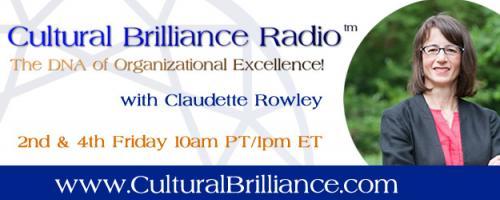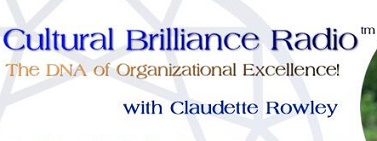
Janet Britcher was interviewed on Cultural Brilliance Radio with Claudette Rowley, about her book, Zoom Leadership: Change Your Focus, Change Your Insights. This is part 4, in which Janet talks about the feel and witness lens of her Zoom Leadership coaching model.
Claudette Rowley: Hi everybody. We are back on Cultural Brilliance Radio. I’m Claudette Rowley and I have been having a really interesting, fun conversation with Janet Britcher. For those of you just joining, she is the author of Zoom Leadership. Janet, one of the things that we’ve been talking a lot about are the four lenses. Think, Act, Feel, and Witness. One thing you said right from the get-go, right at the beginning of our conversation was our– In the business world, particularly in the US, the Think lens and the Act lens are the go-to lenses in most cases. Feel and Witness are less used?
Janet Britcher: Yes.
Claudette: How can organizations and individual leaders start to incorporate the Feel and Witness lenses?
Janet: Well, again, I think it’s acknowledging how much some can speak through the Think lens to activate the Feel lens and how much information that we’re missing if we don’t use the Feel lens. I had a client that say to me recently, “I know you’ll be proud of me, I didn’t get angry”, and I said, “Actually, that’s not my goal”. You might not want to act out your anger but knowing the source of anger is hugely important.
I’m very often in coaching sessions when clients say, “You know, I’m really frustrated and I even don’t know why. Let’s just go down to business”, I always think, “No”. If you’re frustrated and aggravated, there is something there we need to think about, there’s data. If your default is the thinking lens, a way that I would try to bring this to light is to say there’s data missing if you don’t use your feeling lens. And because people who don’t tend to start there are the thinkers and that’s something that does resonate.
And then the other thing is affirming. If you have an opportunity whether with staff that work for you or if you have a coach or even a peer if you make an agreement to be mutually supportive, having someone else affirm what you’re feeling, first of all, noticing how much that reduces stress. Just knowing someone else really gets it, reduce the stress right there and furthermore brings clarity. Having that experience of having feelings recognized and acknowledged.
Second of all, then you have the data from feeling and you have a new world of options and opportunities that open up from that. I would say that to keep that going is find someone that’s affirming. Again, you could journal but noticing how much more energy you have when you’re not trying to suppress the feelings that can inform you.
Claudette: So important, isn’t it? Feelings are a source of information, right? Emotions are a source of information.
Janet: Yes.
Claudette: You’re missing so much with suppression. Absolutely.
Janet: Yes. Missing so much and also spending or sometimes I call it leaking energy. Also, people often don’t know how to navigate between feeling and action. If you feel angry, it doesn’t mean that you should blow up at your boss, let’s say, or at your client but you can notice it and then notice what kind of professional options remain. What can I do that’s appropriate?
I had one client recently who was very frustrated about someone’s participation in a meeting who she felt was not really needed in that meeting because that leader have sent another ambassador, let’s call him, to the meeting and time after time she was really frustrated. So, I said, “What will you want to do?” She said, “I want to ask her not to come”, “Well, how you feel about doing that?” She said, “I guess I could.”
Claudette: Yes.
Janet: Using that. But she had been so professional, overriding her own need to have a more productive meeting. She was overriding her feeling and not getting what she needed. When she asked the person not to come, it was no big deal. Being informed by her feeling and frustration was very useful to her, she was able to take an action she would not have taken if she hadn’t dived into that.
Claudette: Right, right. Such an important point I think I haven’t think of anger as a signal. Somethings not working for me, right? I need to look at this situation-
Janet: Yes.
Claudette: – and see. Is there any action for me to take or not? Do I need to say something or not, right? If I were to ignore that anger I would lose out on that opportunity.
Janet: Yes.
Claudette: Yes.
Janet: Another way to amplify the use of Witness is if you’ve been a leader in meetings then you know who were most likely to talk and who are not and you could let the quieter ones know in advance that you’re going to be asking, “What did you observe?”. Very often, quiet people are quite attentive. They are observing, they may not be speaking, you might feel they’re not “participating” or making a contribution. But in my experience, they’re a very valuable source of observation or witness.
As long as you give them a little advanced notice and don’t catch them by surprise, you could begin to end your meetings with, “And what did you noticed Kim?” or “What did you noticed Sam?”, really be open to and then acknowledge their observations, because they can serve to synthesize issues or synthesize trends of decision making or even to synthesize whether or not you got to a decision and an action plan.
Claudette: Absolutely, and it’s so respectful of them, right? Honoring of what they see as observers.
Janet: Yes.
Claudette: Yes. “What did you see and notice?” “Well, I noticed throughout the entire meeting X, Y, and Z was happening”. Right?
Janet: Yes.
Claudette: And you can go from there. One thing I’d loved to ask you to share, Janet, is a personal message. What would you love leave listeners with today?
Janet: I would say that remembering you’re all proficient in Think, Act, Feel, and Witness. These are skills and abilities we all have and it’s just a question of remembering to use them methodically when you’re stumped. We all know about zooming closer and further. We use it on maps and zooming in on camera lenses. Remembering we’re all proficient with getting closer and further from issues and remembering that that’s a metaphor for the ability to methodically consider options.
Claudette: Thank you. I loved that because it just says, “Hey, we can all do this”, right?
Janet: Yes.
Claudette: This is available. You have some event coming up, right?
Janet: Well, I do. I have a presentation at Williams College. I have a presentation at some Boston Libraries, and I have an offer for your listeners if they’re in the Boston area. As part of my book promotion tour this fall, I will be giving free lunch and learn, hour and half presentations inside of companies. If you have an interest in that and can get back to me by the end of the week, I’d be happy to discuss that further.
Claudette: Awesome, what a great offer. Thank you. For folks in the Boston area, lots of opportunities to interact with Janet. If you’re not in the Boston area, take a look at the book, go in her website and she has so much to offer there. I’d loved to thank you so much, Janet, for being in the show today and sharing this really great information. I want to thank all of you listeners for tuning in to Cultural Brilliance Radio, as always, I had a great time.
Link to parts 1,2 & 3
Zoom Leadership, and the Need for Flexible Focus (Cultural Brilliance Radio – Part 1)
A Tool for Leadership Decisions; Applying the Model to a Client (Cultural Brilliance Radio – Part 3)

